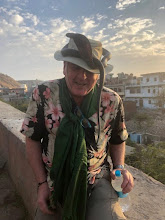Continuing on the subject of Hiroshima, I think it's only fair that I put my points across, and express my own opinion about it. I've vistited the Los Alamos lab in New Mexico, been to the site of the first atomic bomb test in White Sands, New Mexico, and talked to a number of people. I read the visitor's book at Los Alamos, heard the propaganda, and listened to everyone's side of the story.
I can't really say that the bomb was wrong, because I couldn't look in the eyes of the POWs as I said it. On the other hand, I couldn't say it was right, because how could I look at the faces of survivors, or people who lost their families in the explosion?
Yet on the other hand, Japan started the war, and was on the side of the nazis, so I can only say the bomb was, if I have to make a choice, right.
A few years ago I'd never have said that, on the grounds that war is basically inhumane and dropping bombs on civilians is barbarous. I still do think that. But the issue really comes down to responsibility. Few of the peace activists, for example, bring up the fact that Japan was the Axis ally of Germany, that was responsible for the deaths of many millions of Jews and other "undesirables" during that time. Few peace activists bring up the fact that Japan had a terrible history of war crimes, from the torture of its POWs to the treatment of its civilian captors, who were used for slave labour.
Japan was no angel in WW2, and the allies wanted a quick end to the war.
In my opinion, the idea of civilian populations not being involved in war is one of the craziest. I mean, what better way to influence that politicians than to actually get the people so involved, and feel so threatened, that they put pressure on their own leaders?
And so, the threat of annihilation is no longer simply that of the soldier. It becomes the collective responsibility of the entire community. Hitler understood this with his Blitzkrieg, which is why Britain and "Bomber" Harris flattened Germany's cities after the war. It's why America dropped the bomb on civilians, and it's why Al Qeada attack soft, civilian targets, too.
The fact is, that it's no good having an ideal if you have no power. You don't defeat unreasonable people with reason. They aren't connected to it. You can only defeat "unreason" with power.
All the rational idealism in the world won't stop a rabid dog from attacking you. What you have to do is either disable the dog or kill it. And you can't pussyfoot around, spending your entire life trying to teach it to not be a rabid dog. There are too many rabid dogs around to worry about just one of them.
The whole business of war and peace is, I'm absolutely convinced, way beyond any one of our understanding. The ideals are great, yes. Wouldn't it be wonderful if we all got on nicely? Yes of course it would. But what do you do if we don't is the next question. As it is, we don't. So we need to defend ourselves with whatever means are needed, until such a time as peace breaks out.
That's the way I see it, and if anyone sees things otherwise, please leave a comment. Because I'd much rather things were different.
Personally, I think that perceiving an enemy is inevitable. We fear those who have power, because it means that, if we think erroneously "our power is taken away". That's why a common enemy always unites us.
I realise that I may lose friends from expressing this opinion. But what can I do? If you can help me change my mind, then great.
But war, it seems to me, is just one of those absurdities that goes with the territory of being human, and therefore imperfect. The bomb is only an extension of that absurdity. Whether your going to have someone look you in the eyes as he shoves a bayonet into your intestines, and laughs with glee as you breathe your last, or if your last moment is to take part in a mushroom cloud, then it's pretty much six of one or half a dozen of the other.
Saturday, August 06, 2005
Idealism and powerlessness
Posted by
Jack Lee
at
10:35 AM
![]()
Subscribe to:
Post Comments (Atom)

No comments:
Post a Comment